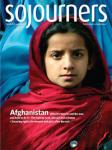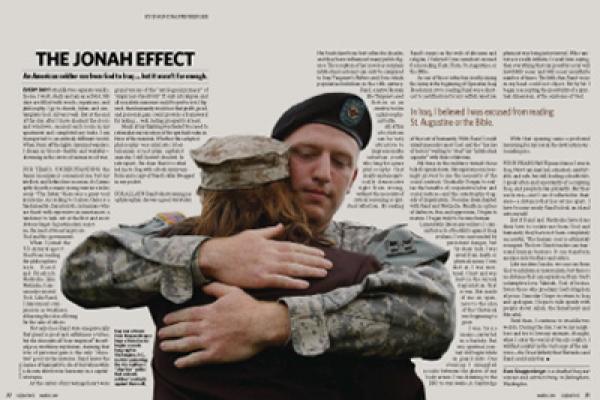Every day I straddle two separate worlds. In one, I work, study, and am an activist. My days are filled with words, equations, and philosophy. I go to church, listen, and contemplate God. All very well. But at the end of the day, after I have checked the doors and windows, secured each room in my apartment and completed my tasks, I am transported to an entirely different world. When I turn off the lights, my mind wanders. I dream in blood -- fearful and wakeful -- drowning in the rivers of memories of war.
For years, understanding the Sunni insurgency consumed me, fed my intellect, and defined me as a man. As Camus aptly describes many young warriors in his essay "The Rebel," there was a great void inside me. According to Camus, there is a fundamental characteristic in humans who are faced with repressive circumstances: a tendency to lash out at the first and most obvious target. In postmodern societies, the most obvious targets are God and the government.
When I joined the U.S. Army at age 17, I had been reading the philosophers Ayn Rand and Friedrich Nietzsche. Like Nietzsche, I consciously rejected God. Like Rand, I denounced compassion as weakness, abhorring the idea of living for the sake of others.
Not only does Rand state unequivocally that greed is good and selfishness a virtue, but she discounts all "non-empirical" knowledge as worthless mysticism, claiming that love of personal gain is the only "objective" good in the universe. Rand leaves the masses of humanity to die of starvation while a chosen elite live in harmony in a capitalist utopia.
At the center of my teenage heart were grand visions of the "ontological primacy" of "empirical objectivity." If only all religion and all socialistic nonsense could be put to rest, I figured, then humanity would see that profit, greed, and personal gain could provide a framework for lasting ... well, lasting prosperity at least.
Much of my thinking was fueled by a need to rationalize my rejection of the spiritual realm in favor of the material. Whether this adopted philosophy was nihilistic libertarianism or just plain capitalist anarchy, I still haven’t decided. In retrospect, I'm clear that it is what led me to Iraq with a fresh Army uniform and a copy of Rand's Atlas Shrugged in my pocket.
For all Ayn Rand’s shortcomings as a philosopher, she was a good storyteller. Her books have been best-sellers for decades, and they have influenced many public figures. The reception of her novels as common intellectual currency can only be compared to Ivan Turgenev's Fathers and Sons, which popularized nihilism in the 19th century. Rand, a native Russian like Turgenev, used fiction as an emotive tool in a philosophical battle.
All of this absolutism can be very attractive to impressionable suburban youth who long for a pure philosophy that clearly and unequivocally demarcates right from wrong, without the necessity of critical reasoning or spiritual reflection. By reading Rand’s essays on the evils of altruism and religion, I believed I was somehow excused from reading Kant, Plato, St. Augustine, or the Bible.
As one of those suburban youth joining the Army at the beginning of Operation Iraqi Freedom in 2003, reading Rand was a shortcut to justification for my selfish rejection of the rest of humanity. With Rand I could simultaneously reject God and the "hordes of looters" waiting to "steal" my "intellectual capacity" with their relativism.
My time in the military turned those beliefs upside down. My experience increasingly proved to me the necessity of the social contract. Gradually I began to realize the benefits of cooperative labor and social justice -- and the catastrophic tragedy of imperialism. I became disenchanted with Rand and Nietzsche. Finally, in a place of darkness, fear, and oppression, I began to mature. I began truly to become human.
Lamentably, like many soldiers, I committed acts of hostility against Iraqi civilians. I was surrounded by persistent danger, but by sheer luck I was saved from death or physical injury. I was shot at. I was mortared. I hurt and was hurt in the surreal degradation that is war. But inside of me an openness to the idea of the Universal was beginning to grow.
I was, by no means, converted in a foxhole. But my spiritual journey did begin while on guard duty. One evening I smuggled a radio between the plates of my body armor. I was listening to the BBC to stay awake. A Cambridge physicist was being interviewed. If the universe is really infinite, I recall him saying, then everything that can possibly occur will inevitably occur and will occur an infinite number of times. The little Ayn Rand-voice in my head could not object. Bit by bit I began reaccepting the possibility of a spiritual dimension, of the existence of God.
With that opening came a profound mourning for my role in the destruction surrounding me.
Four years have passed since I was in Iraq. Now I am married, educated, comfortable, and safe, but still leading a double life. I speak often and repentantly of occupying Iraq, and people listen patiently. But they see in me -- and I see it reflected in their eyes -- a distance that has set me apart. I have become nearly Rand’s ideal: an island unto myself.
But if Rand and Nietzsche have done their best to isolate me from God and humanity, they have not been completely successful. The human soul is ultimately resurgent. The love Christ teaches can transcend human barriers. It can transform enemies into brothers and sisters.
Like modern Jonahs, we can run from God to nihilism or materialism, but there is no distance that can separate us from God's redemptive love. Yahweh, God of Justice, favors those who proclaim God’s kingdom of peace. Someday I hope to return to Iraq and apologize. I hope to talk openly with people about Allah, the Beneficent and Merciful.
Until then, I continue to straddle two worlds. During the day, I serve my neighbors and try to love my enemies. At night, when I enter the world of bloody conflict, I will find comfort in the vast scope of the universe -- the Great Infinity that Nietzsche and Rand could only fear.
Evan Knappenberger is a disabled Iraq war veteran and activist living in Bellingham, Washington.

Got something to say about what you're reading? We value your feedback!
